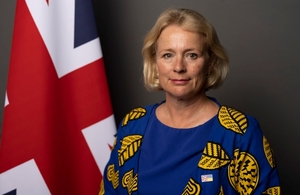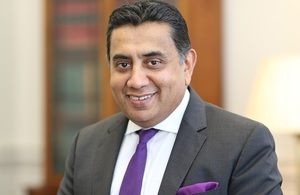Thank you Mr Chair. Over the past weeks, we have seen that the strong will, courage and remarkable military skill of the Armed Forces of Ukraine has not only minimised Russian gains, but also enabled substantive advances through counter attacks in eastern and southern areas of Ukraine.
As Ukraine continues offensive operations in the north-east of the country, Russian forces have sought to establish a defensive line between the Oskil River and the town of Svatove. This zone is important to Russia, it contains one of the few main resupply routes Russia still controls from the Belgorod region of Russia into Ukraine. Additionally, this line sits along the border of Luhansk Oblast which Russia declared its intent to seize as one of its immediate war aims.
As Russia digs in and attempts to defend this zone, Ukrainian Forces have now begun to conduct offensive operations east of the Oskil River and reports indicate that they are now in control of Bilohorivka, a village located in the Luhansk oblast. It is increasingly unclear whether Russia’s front-line forces have sufficient reserves or adequate morale to withstand another concerted Ukrainian assault.
Mr Chair, recent reporting indicates that, despite their purported overall size, sufficient Russian manpower for its invasion of Ukraine remains a key challenge for the Russian military and presents a stark mismatch between ambition and reality. Last July, in this Forum, we discussed the attempts by the Kremlin-linked Russian private military company, Wagner Group, to recruit Russian convicts for service in Ukraine. This has been reinvigorated. A video recently posted online appears to show Wagner owner Yevgeny Prigozhin making a recruitment pitch to prisoners. In the video, Prigozhin emphasises that he is only seeking “fighters for assault units”. In return, prisoners have been offered commutation of their sentences as well as cash incentives.
Additionally, numerous reports indicate that the Russian military is deploying mobile recruitment offices throughout Russia to attract “contract soldiers” to fight in Ukraine, selling the proposition as “the choice of a real man”. A significant monetary incentive is also being offered to these potential “contract soldiers”.
It is a telling indication that the Russian leadership has resorted to bribing its citizens and convicts to join the so-called “Special Military Operation” in an attempt to bolster its force levels.
Separately, Russian military academies are now shortening training courses and bringing cadets’ graduation dates forward. Almost certainly to enable the early release of cadets so that they can be deployed more quickly in support of the Ukraine operation.
Mr Chair, in sum, the impact of Russia’s manpower challenge has become increasingly severe. The acceleration of officer cadets’ training, the recruitment of “contract soldiers” and Wagner’s demand for assault troops suggests that two of the most critical shortages within the Russian military manning crisis are combat infantry and junior commanders.
Further to this, President Putin’s decision to impose a partial mobilisation shows he is willing to break his own promises and also sacrifice citizens of Russia for his so-called “Special Military Operation”. This mobilisation is a clear admission that President Putin’s mission is failing. He and his Defence Minister have sent thousands of their own citizens to their deaths, poorly trained, poorly equipped and poorly led. No amount of threats and propaganda can hide the fact that Ukraine is winning this war, the international community are united and Russia is becoming a global pariah.
Meanwhile, at the FSC, our Russian colleagues would rather we did not focus on Russia’s struggles to resource its illegal war of choice. Last week we saw efforts to distract from these setbacks and shift blame onto others by doubling down on tired old narratives, seeking to justify the unjustifiable, to this Forum and the Russian population.
These maladroit attempts to obfuscate the truth fool no one. The clear and unambiguous fact is that it is the Russian leadership who decided to conduct its unprovoked and illegal invasion of Ukraine. Russia was warned that such a reckless act would be a strategic mistake, a strategic mistake that would have strategic consequences. The blame for the impact of these consequences lies solely with the Russian leadership and military – no one else.
Russia’s aggressive actions have brought into sharp focus for many countries what was once unthinkable – Russia’s willingness to invade a sovereign neighbour. In response, the UK, along with others who seek a secure and stable future in the Euro-Atlantic area, is strengthening its defensive capabilities, including though the NATO Defensive Alliance, to protect against Russia’s chosen path of naked aggression.
Mr Chair, the Kremlin’s conspiracy theories and self-serving propaganda that seek to portray Russia – the aggressor who has unleashed horrendous violence on Ukraine – as the victim, is nothing more than the textbook delusion of an oppressor who has severely miscalculated.
As our Ukrainian friends have so aptly demonstrated: “Courage is fire, bullying is smoke.”
Finally Mr Chair, I would note that just yesterday, it was reported that Russia is pressing ahead with plans to carry out a referendum in temporarily controlled areas. Any Russian attempt to hold sham referenda on the sovereign territory of Ukraine would have no legitimacy and will be met with a coordinated response from Ukraine’s partners.
Mr Chair, the UK stands in solidarity with Ukraine, including through the ongoing provision of military assistance, as Ukrainians defend their homeland and fight for the simple right to a free, peaceful and prosperous future. Thank you

